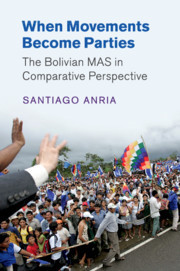When Movements Become Parties The Bolivian MAS in Comparative Perspective Cambridge Studies in Comparative Politics Series
Langue : Anglais
Auteur : Anria Santiago

Provides a new way of thinking about parties formed by social movements, and their evolution over time.
Why do some parties formed by social movements develop top-down structures while others stay more open and responsive to their social bases? The first rigorous comparative study of movement-based parties, this book shows not only how movements can form parties but also how movements contribute to parties' internal politics and shape organizational party models over the long term. Although the existing literature argues that movement-based parties will succumb to professionalization and specialization, Anria shows that this is not inevitable or preordained through an in-depth examination of the unusual and counterintuitive development of Bolivia's MAS. Anria then compares the evolution of the MAS with that of other parties formed by social movements, including Brazil's PT and Uruguay's FA. In a region where successful new parties of any type have been rare, these three parties are remarkable for their success. Yet, despite their similar origins, they differ sharply in their organizational models.
Introduction; 1. Theoretical framework and methods; 2. Origins and ascendance to power; 3. Candidate selection patterns; 4. National policymaking patterns; 5. The MAS in comparative perspective; Conclusions.
Santiago Anria is Assistant Professor of Political Science and Latin American Studies at Dickinson College, Pennsylvania. His research focuses on social movements, political parties, and democracy in Latin America, and has appeared in journals including Comparative Politics, Comparative Political Studies, the Journal of Democracy, and Latin American Politics and Society. He received his Ph.D. in Political Science from the University of North Carolina, Chapel Hill.
Date de parution : 11-2019
Ouvrage de 305 p.
15x22.5 cm
Date de parution : 11-2018
Ouvrage de 300 p.
15.7x23.5 cm
Thème de When Movements Become Parties :
© 2024 LAVOISIER S.A.S.



